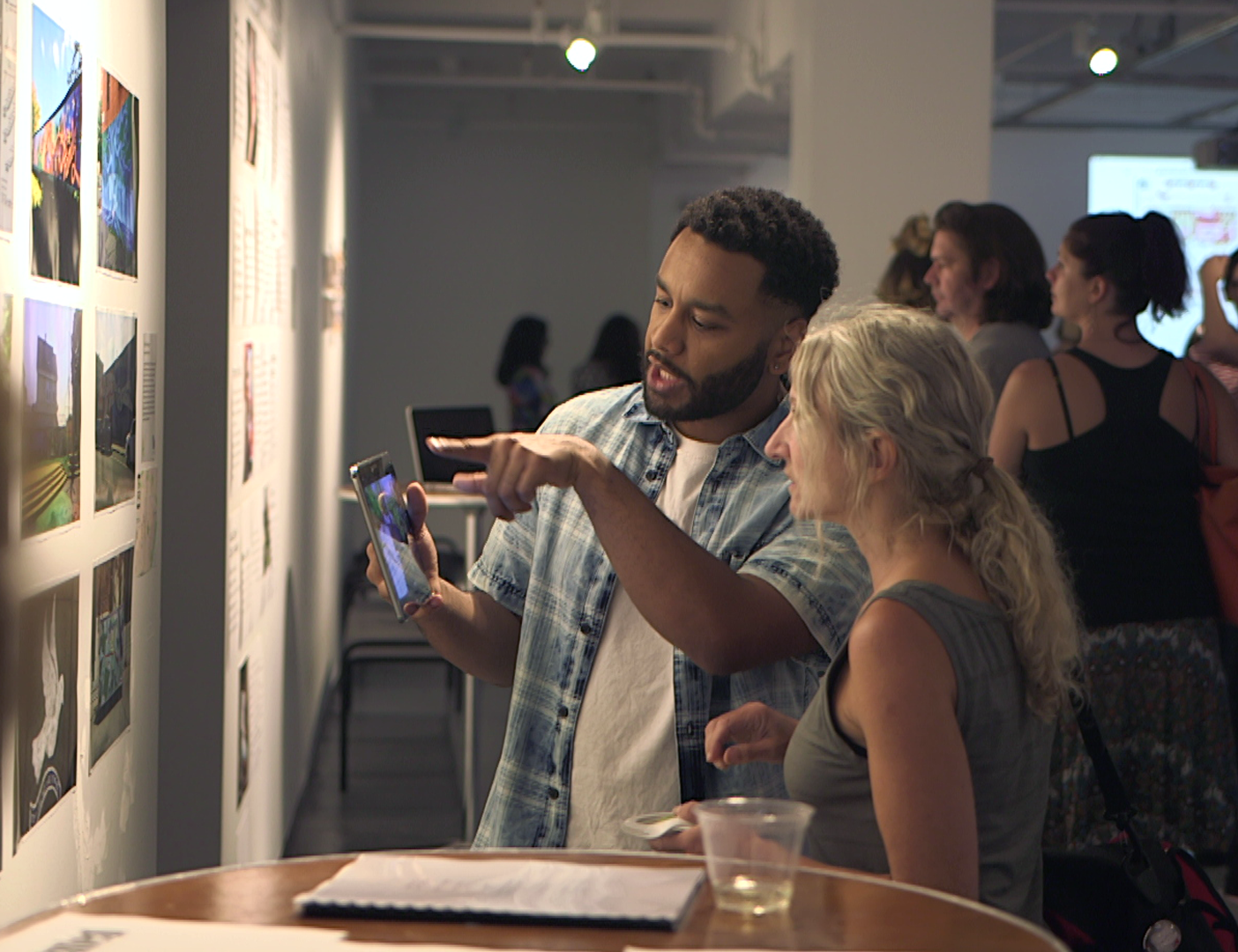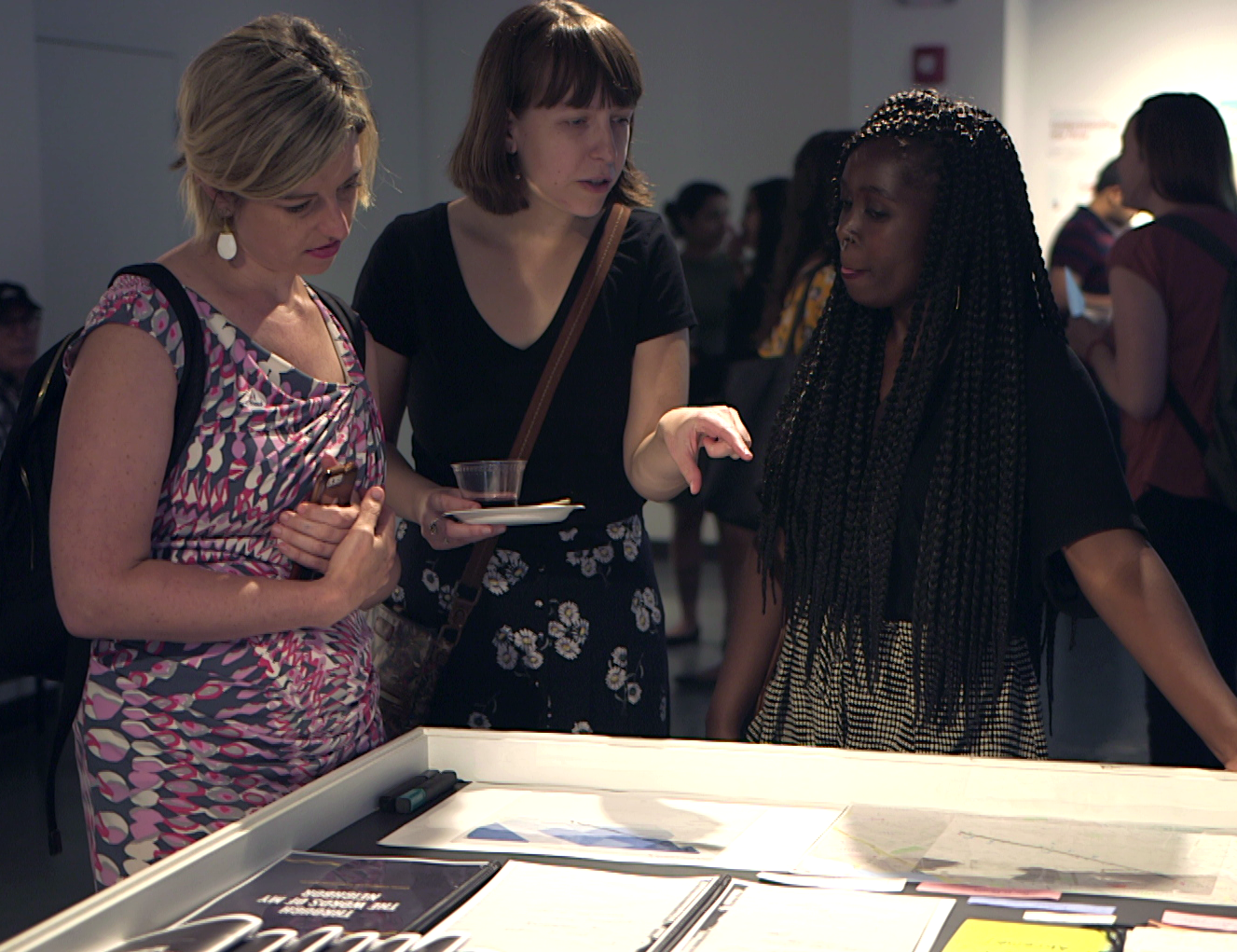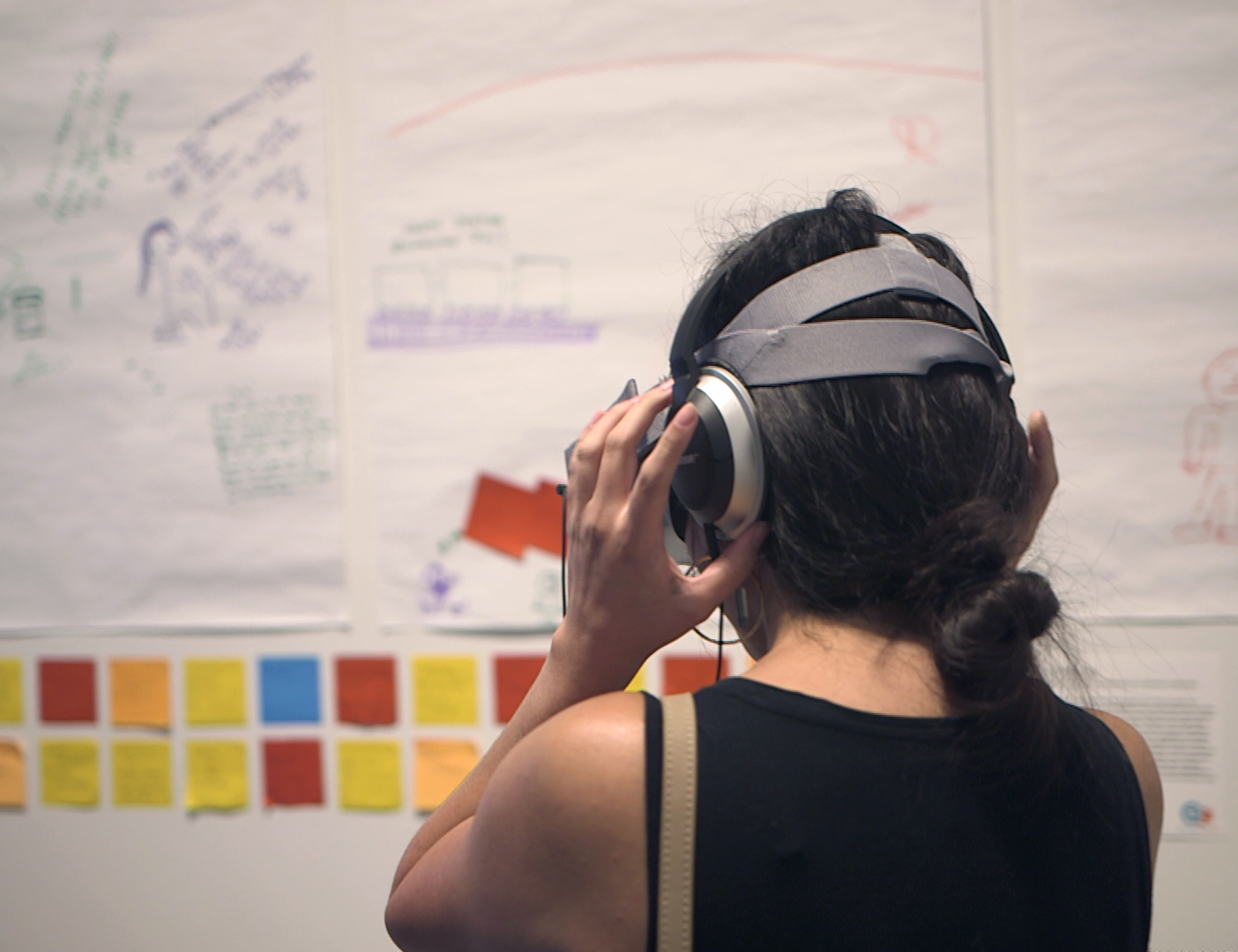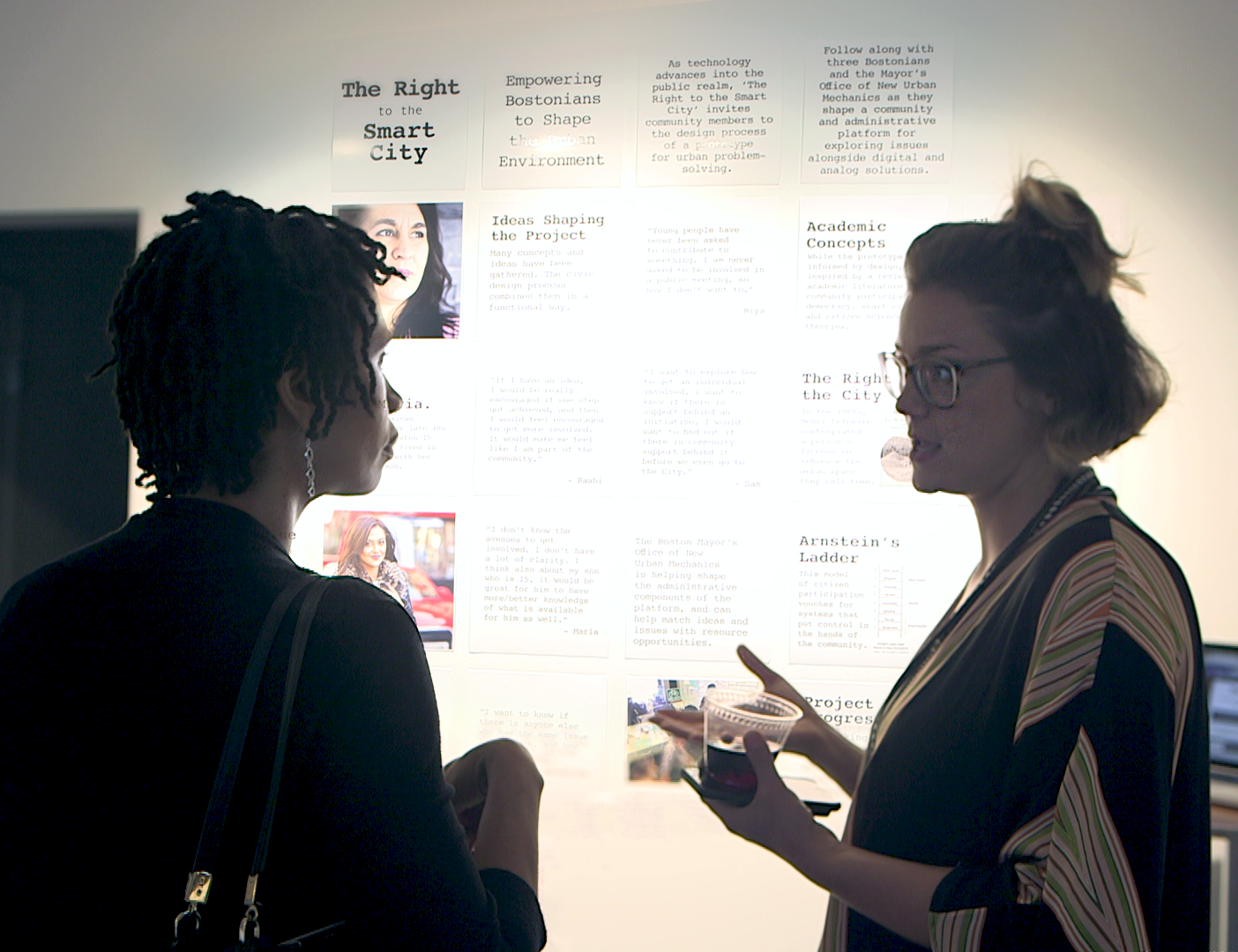This Year’s CMAP Cohort Leverage Technology & Research, Exhibit Civic Media Projects
Friday, September 14, 2018


Earlier this month, educators, students, technologists, and citizens throughout the greater Boston area came together at Emerson College’s Urban Arts Gallery to celebrate this year’s cohort of Civic Media: Art and Practice (CMAP) graduate students and experience their final civic media projects.
Each year, our CMAP program brings together ambitious entrepreneurs, activists, artists, technologists, and engineers to research and design cutting-edge projects that leverage new media and technology to promote a more civically inclusive future.
Working closely with our esteemed faculty, they develop a deep knowledge base and broadly applicable skillset that prepares them for a myriad of potential careers in the communication and innovation sectors.
This year’s cohort put together some hugely groundbreaking thesis projects — keep reading for a look at what each student brought to the table this year.

Melissa Teng —
Working closely with talented VR filmmakers and women serving prison sentences, Melissa developed a series of VR short films that help prepare incarcerated women for potentially stressful situations they may face upon release.
Holding a series of workshops, Melissa collaborated with inmates at a local womens’ prison to identify potentially challenging situations these women might face after they’ve served their sentences, such as difficulty navigating public transit or invasive questioning by potential employers. Paired with group discussions, Melissa hopes that films like these can help prepare people in prison for the reality of re-entry and better enable their future success.
Stanley Dominique —
For his project, Stanley developed an AR tool that can interpret public artworks and provide important context and background information about the artists and communities behind them.
Running from a tablet or smartphone, Stanley’s AR tool was able to accurately identify multiple photos of public artworks. Through this tool, Stanley hopes to improve representation and self-determination for artists of color who are too often relegated to the sidelines of our retellings of history.
Justin Warren —
Justin, working with the City of Portland’s Office of Economic Opportunity and key Engagement Lab staff, developed (Port)Land of Opportunity.
(Port)Land of Opportunity is an educational game that enables players to step into the shoes of immigrants or refugees moving into Portland, Maine. Players spend their in-game time and money navigating Portland’s resources in order to reach their goals, such as English proficiency and job training.
All of the locations and services in the game are real, and players can offer feedback on how accessible these real services were based on their gameplay experiences. Justin hopes that feedback collected based on this game can improve Portland, Maine’s real-world services.
If you’re interested in trying (Port)Land of Opportunity, it’s available to play for free at https://portland.opportunitygame.org/.
Becky Bastien —
Working to address the isolation and emotional hardship that many LGBTQ+ youth disproportionately face, Becky developed a prototype for a mentorship app called LGBTQ&A.
LGBTQ&A is a digital safe space that enables LGBTQ+ youth to ask questions and receive guidance from mentors & leaders representative of their gender and/or sexual identity. Young people from the LGBTQ+ community were polled throughout the prototype’s development, informing many of the app’s features, with the hope that by sharing experiences and making critical connections the LGBTQ+ community can become more accessible worldwide.

Lauren Stott —
Lauren’s project, Right to the Smart City: Empowering Bostonians to Shape the Urban Environment invites community members to design a prototype for urban problem-solving.
As smart city technologies impact the lives of citizens more and more, implementing them with transparency and respect for citizens is of paramount importance. Throughout her time in the CMAP program, Lauren built a prototype of an online space in which members of the greater Boston community can come together, contemplate issues and share ideas, encouraging other members with access to key resources to help solve problems.
Lauren’s project will undergo one further round of revisions based on feedback from stakeholders before being completed.
Neil Perry —
Neil’s project was a short documentary film about big data economics and data justice, titled* #MYDATAMYDOLLARS,* which was screened in its entirety at the Exhibition.
This film, which was written, shot and edited by Neil, examines the current economy of big data and posits several ways in which the value of big data can be leveraged to support a social safety net in an era of increasing automation and financial inequity.
In addition to his completed film, Neil also produced a detailed blog covering his experience creating this final project, which is available at https://www.mydatamydollars.org.
Aakanksha Gupta —
Aakanksha developed Community Storytelling Guide: Best Practices to Convey Stories About Migration, an open resource which strives to support storytellers and mediamakers as they prepare themselves to work with a wide range of migrants who want to share their stories online.
Stories about migration help to build awareness and empathy about the experiences that people face during the migration process, and are especially important in this political climate. Community Storytelling Guide helps storytellers become more inclusive and responsible, better enabling them to safeguard minority communities.
If you’re interested in downloading the resource, it’s available for free at https://www.communitystorytelling.org/.
Anna Ladd —
For her project, Anna created a community-sourced museum at the Marilyn Rodman Performing Arts Center in Foxboro, MA which featured objects, memories, and stories. This community museum used participatory methods to build its collection with the goal of creating better representation for marginalized groups in formal exhibition spaces.
In addition to its participatory collection methodology, Anna’s community museum also allows participants to hold, read, and rearrange the various objects in the collection.
New submissions are still being collected for exhibition in the museum. More information about the exhibition is available at https://foxborocommunitymuseum.com.
Sharon Amunguni —
Sharon’s project, Through the Words of my Neighbors: Voices Collected in Transit, explores the ephemeral nature of the Somerville’s current housing situation through short narratives collected in transitory public spaces.
The content, submitted at various bus stops, sidewalks and the reference desk of the local public library, were crafted into a community zine. The zine will be made available at the local library, and aims to call attention to a neighborhood’s existence at this particular moment in time while providing an outlet for residents to share their voice.